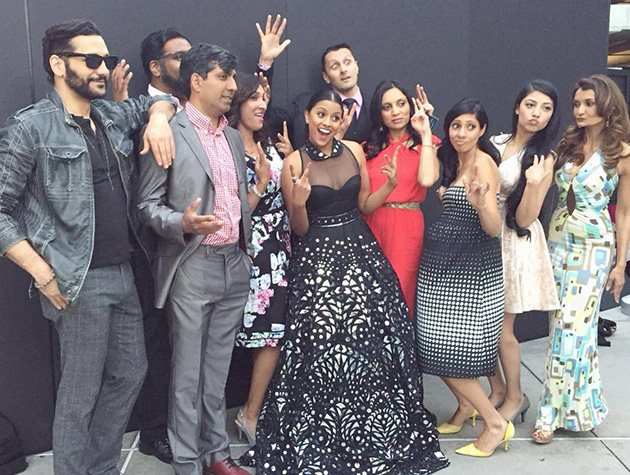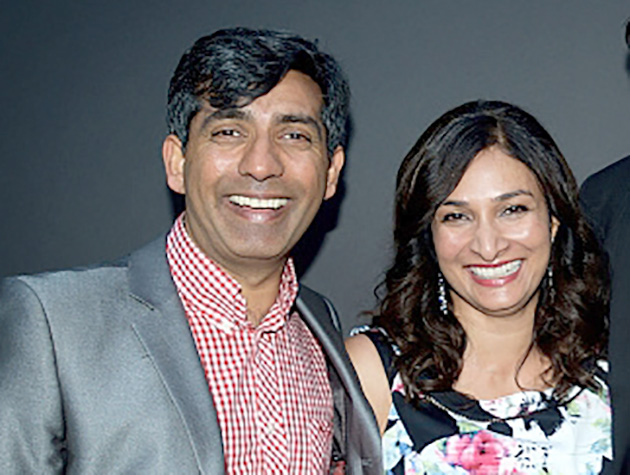
BY NEHA SARIN
Ravi Kapoor, the director of Miss India America talks about the movie, what working with his spouse, Meera Simhan was like and Kickstarter. Whilst this is his first feature film, Ravi is a familiar face as an actor, having been in numerous television shows such as ‘Crossing Jordan’, ‘My Name is Earl’, ‘ Heroes’ and ‘Fringe’.
Ravi Kapoor, the director of Miss India America talks about the movie, what working with his spouse, Meera Simhan was like and Kickstarter. Whilst this is his first feature film, Ravi is a familiar face as an actor, having been in numerous television shows such as ‘Crossing Jordan’, ‘My Name is Earl’, ‘ Heroes’ and ‘Fringe’.
An Indian guy making a movie about Indian-American teenage girls in California, how come?
It’s all because of Meera. She’d written a piece about her experiences competing in Indian-American beauty pageants and we thought it would be a great setting to explore the themes of winning and ambition.
‘Miss India America’ came to fruition by a successful Kickstarter campaign – could you maybe tell our readers a little bit about what that actually means?
Kickstarter is crowdfunding platforms where you pitch the project you want to launch and ask people to donate money towards it. In return you can offer rewards. It’s a great way to find out if there’s an appetite for your project and it helps you build your audience from the get–go.
You co-wrote the movie with your wife. How was that like?
It was great. Individually we have different qualities as writers. I tend to have a quirky comic sensibility and Meera’s writing is more emotionally grounded, and together we found this new voice that melds those two sides really nicely. We’d occasionally have some fights about the work but they always lead to better ideas.
Did you have a better vision as a director because it was your own script?
Being the co-writer and living with it from the conception you can’t help but have a handle on all the nuances of the story and characters. There are still many surprises and pivots that reveal themselves through the shooting and editing of the film. You never stop discovering new things through the process.
How was it directing your wife? How do you balance the professional with the home life?
When I’m directing Meera I have to make a conscious effort to treat her with the same care that I approach the other actors. When you have a strong personal relationship with someone there can be a tendency to be overly blunt in your communications, which isn’t always great for an actor’s confidence. In terms of balancing home and work we try to give ourselves cut off times where we are not allowed to talk about the work. But sometimes the work just becomes 24/7.
Can you tell me about how you cast Tiya Sircar?
Meera had played her mom twice before, on an episode of ‘Numbers’and then ‘Touch’, and I had played Tiya’s father in that episode of TOUCH. So we knew her work and had a feeling she would be perfect for it. And she does a fantastic job as Lily. On paper the character can appear very unsympathetic but she really brings the audience along on the characters’ journey.
What is it like to be Indian in today’s times?
I’m not sure. I think our journeys are the product of so many factors and our ethnicity is only one of them. But I think as a storyteller in Hollywood it’s a prime moment to get our stories out there. There’s a recognition that the audiences are, and maybe always have been, ready for diverse point of view.
What next for you? More acting? More directing?
I have a couple of features that I would love to find financing for and Meera and I have written a TV family comedy pilot that we would really like to see happen.
It’s all because of Meera. She’d written a piece about her experiences competing in Indian-American beauty pageants and we thought it would be a great setting to explore the themes of winning and ambition.
‘Miss India America’ came to fruition by a successful Kickstarter campaign – could you maybe tell our readers a little bit about what that actually means?
Kickstarter is crowdfunding platforms where you pitch the project you want to launch and ask people to donate money towards it. In return you can offer rewards. It’s a great way to find out if there’s an appetite for your project and it helps you build your audience from the get–go.
You co-wrote the movie with your wife. How was that like?
It was great. Individually we have different qualities as writers. I tend to have a quirky comic sensibility and Meera’s writing is more emotionally grounded, and together we found this new voice that melds those two sides really nicely. We’d occasionally have some fights about the work but they always lead to better ideas.
Did you have a better vision as a director because it was your own script?
Being the co-writer and living with it from the conception you can’t help but have a handle on all the nuances of the story and characters. There are still many surprises and pivots that reveal themselves through the shooting and editing of the film. You never stop discovering new things through the process.
How was it directing your wife? How do you balance the professional with the home life?
When I’m directing Meera I have to make a conscious effort to treat her with the same care that I approach the other actors. When you have a strong personal relationship with someone there can be a tendency to be overly blunt in your communications, which isn’t always great for an actor’s confidence. In terms of balancing home and work we try to give ourselves cut off times where we are not allowed to talk about the work. But sometimes the work just becomes 24/7.
Can you tell me about how you cast Tiya Sircar?
Meera had played her mom twice before, on an episode of ‘Numbers’and then ‘Touch’, and I had played Tiya’s father in that episode of TOUCH. So we knew her work and had a feeling she would be perfect for it. And she does a fantastic job as Lily. On paper the character can appear very unsympathetic but she really brings the audience along on the characters’ journey.
What is it like to be Indian in today’s times?
I’m not sure. I think our journeys are the product of so many factors and our ethnicity is only one of them. But I think as a storyteller in Hollywood it’s a prime moment to get our stories out there. There’s a recognition that the audiences are, and maybe always have been, ready for diverse point of view.
What next for you? More acting? More directing?
I have a couple of features that I would love to find financing for and Meera and I have written a TV family comedy pilot that we would really like to see happen.



 RSS Feed
RSS Feed
